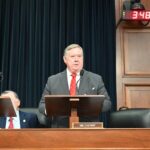
A Biden administration proposal that would require defense contractors to disclose their greenhouse gas emissions (GHG) and plans to reduce those emissions was rejected by the House Armed Services Committee (HASC) last week. The administration’s proposal is still going through the federal rulemaking process and applies to all federal contractors. However, the HASC last week during markup of its recommendations for the fiscal year 2024 defense authorization bill approved an amendment that would prevent the Defense Department from requiring contractors…

 By
By 











